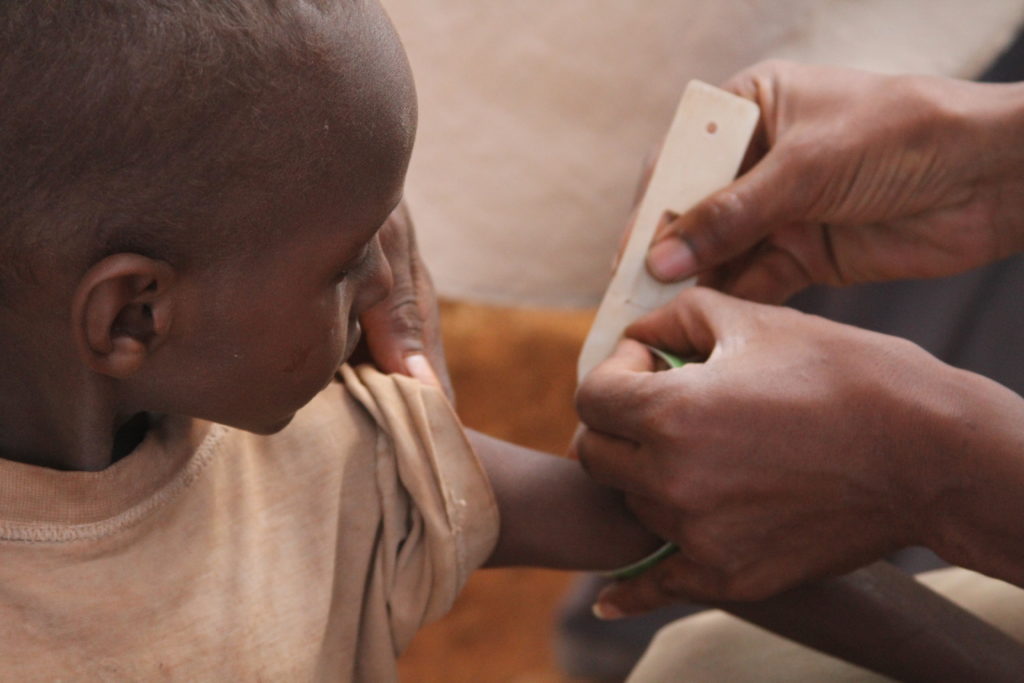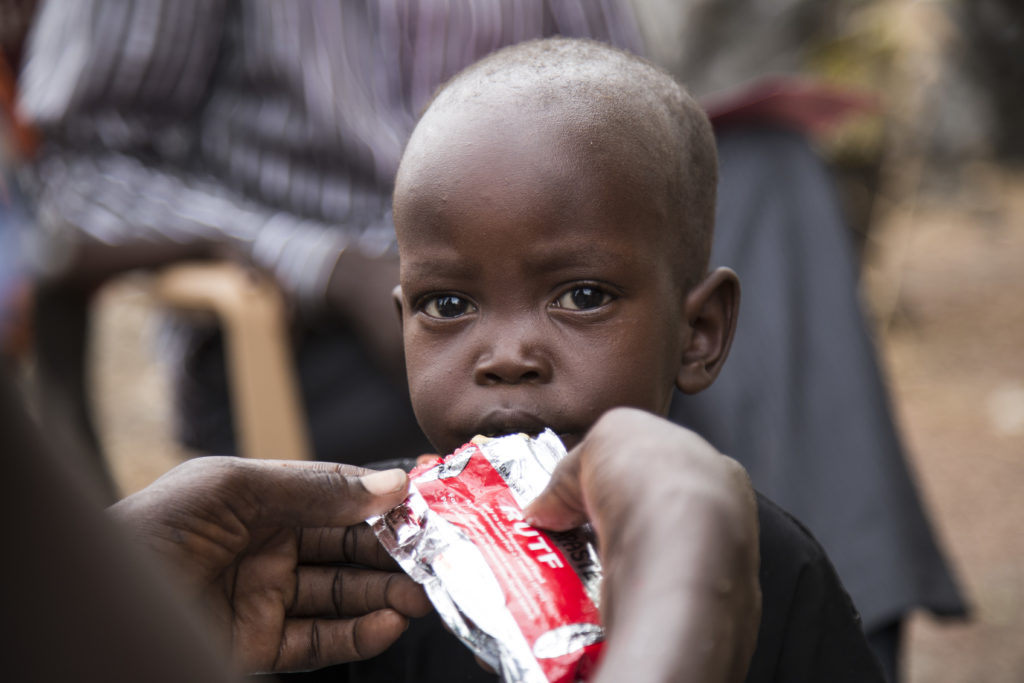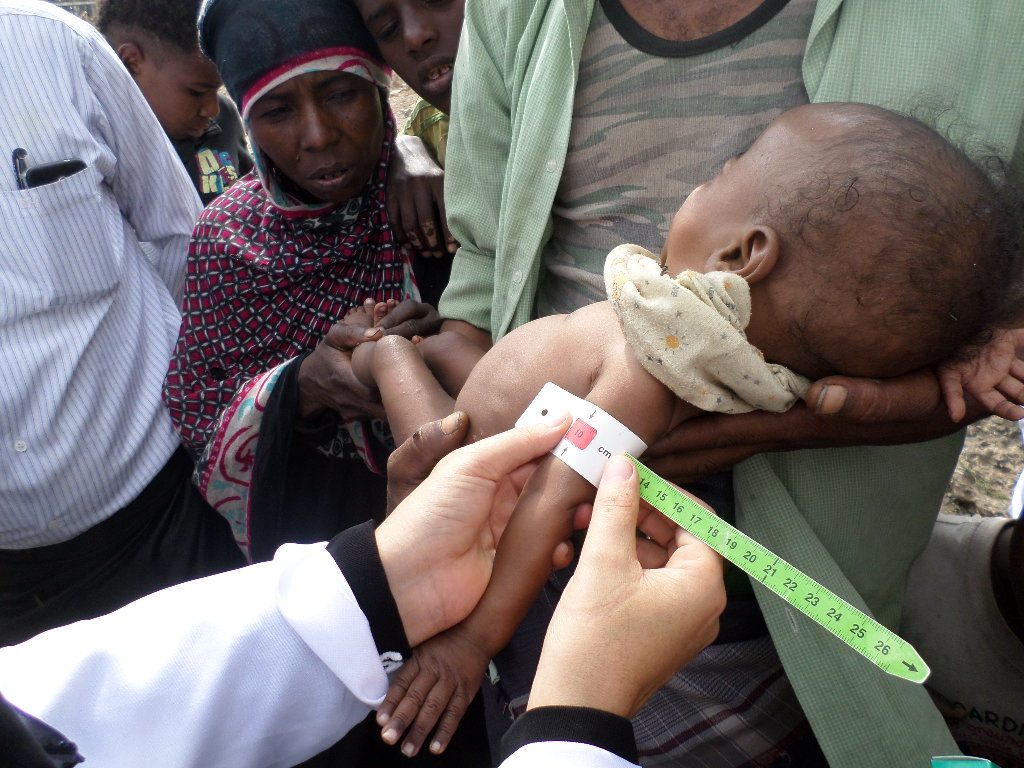Samuel Mbuto is full of heart. I hear it immediately. It’s something more than passion or conviction for a cause; it’s a delicate hopefulness and an innate joyfulness built from years of dedication and hard work. As a Nutrition Manager for International Medical Corps, Samuel consistently confronts harrowing starvation in children and, sometimes, devastating loss. But his memory is also abundant with many gains: smiling mothers and children, growing healthy, who would not have lived had International Medical Corps not been there.
Samuel credits his parents with his work ethic and positive outlook. He grew up in a rural community in eastern Uganda, in “quite challenging and very humbling” circumstances. After walking five kilometers to and from school each day, Samuel and his siblings would help his hardworking parents—who spent most of their time on the farm—by doing household chores, such as fetching water and cleaning. But he feels proud of his parents and thanks them for “training us to work with our own hands, be patient and focused, and treat people right.” Samuel is careful to pass on these same values to his five children today.
Samuel studied clinical medicine and community health at university, and worked at a private hospital in Kampala before joining Medicine Sans Frontiers in northern Uganda during an insurgency by the Lord’s Resistance Army—a conflict that displaced 1.7 million people. This was his first humanitarian relief experience, and he worked as a clinician at a camp with about 30,000 people.

His passion for the work would lead him to several more positions throughout Uganda, including with Action against Hunger helping pastoralists in the Karamoja region struggling with drought-induced famine, and treating children with acute malnutrition. Throughout his work, he prioritized the training of community health volunteers to be able to screen, identify and treat children under five with common childhood illnesses and, for more severe cases of malnutrition, to refer them to health facilities. This helped build the resilience of the communities he served—a central tenet of International Medical Corps’ approach to health.
Samuel’s first job with International Medical Corps took him to South Sudan, as a Social Behavior Change Nutrition Manager, in 2012. He arrived in the capital city of Juba and was given an airline ticket the very next day. Samuel laughs heartily as he says, “I will always remember my first mission because I was given a little hut to live in, and the first time I entered the hut about 200 bats flew out!” The giant lizard that had staked out the hut before Samuel got there “eventually became his friend.” And he wasn’t the only one with “visitors”—Samuel laughs as he describes the snake in his female colleague’s hut, calling the entire experience “adventurous and motivating.”
In the very remote area where he worked in South Sudan, people had no access to medical services before International Medical Corps arrived, and levels of hunger were exceptionally high. The work was dangerous because of constant flares in intercommunal violence. But Samuel sees humanitarian work as “quite encouraging.” He describes with palpable emotion how “incredibly moving” it was to see health workers and mothers arrive at the International Medical Corps field office to collect medication and nutrition supplies, and transport them to health facilities deep in the rural areas. They would walk for days carrying 33-pound cartons of Plumpy Nut to treat and nourish starving children, as well as bringing much-needed medicine to highly underserved communities.

“You see a mother who has lost hope—but then, through the treatment, the child survives and thrives again, and she can take him or her home healthy,” he says. “This encourages the health facility workers and they feel hopeful. It’s very rewarding.”
In 2013, Samuel moved to Juba as a nutrition coordinator, supervising nutrition managers based in five field offices, including in one of South Sudan’s largest refugee camps, Maban. He and his colleagues faced many challenges in getting supplies; often, planes could not land because of fighting or heavy rains. But “we were able to collaborate with other actors to get services to those in need,” says Samuel. “I am very proud of the work we did in South Sudan.” He is particularly proud of the training he provided for national staff, enabling them to treat acute malnutrition cases and write and analyze reports.
After a few years, Samuel received a challenge from his supervisors: where do you think you could make the biggest impact? After careful consideration, he chose Yemen—far from his wife and young children in Uganda. Roughly 1.8 million children and 1.1 pregnant and lactating women are acutely malnourished in Yemen, desperately in need of lifesaving nutrition services. Samuel knew he had much to contribute to International Medical Corps’ work there.

Despite Yemen being a conflict-ridden, chronically insecure and deeply impoverished nation, Samuel brightly reports: “My time here has been so great!” In his four months so far based in Yemen, he has been able to travel to the field twice—a five-hour journey from Sanaa’, full of many roadblocks and armed soldiers. But he describes the work as “really amazing” and tells me that “the satisfaction we get from being in the field is huge.”
Samuel and his team see children arrive at International Medical Corps facilities on the brink of death, but with our services, they start to gain weight and come back to life, able to leave happy and strong. “Yes, it is quite risky,” says Samuel. “But every time they come for our services or we go to their households, we are saving lives.”
Today, Samuel’s biggest focus is training, supporting and encouraging Yemeni health workers. I can tell he not only builds skills, he also bolsters spirits. With an optimism that defies statistics and a lightness that is extraordinary given his experiences, Samuel tells me he that looks forward to “the day when the national staff will be self-reliant to help the children of Yemen.” Then he speaks with abundant warmth and enthusiasm about his upcoming trip to Uganda to visit his own “wonderful children”—and, once again, his huge heart fills my own.
